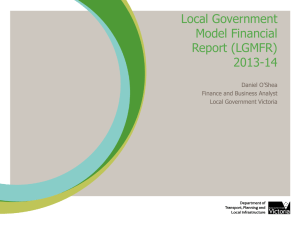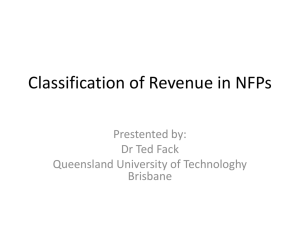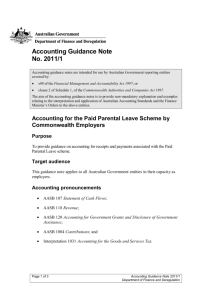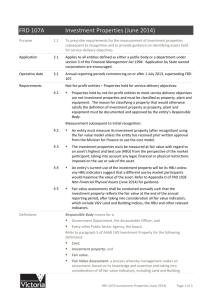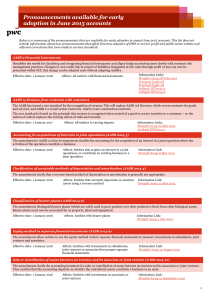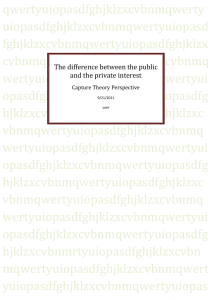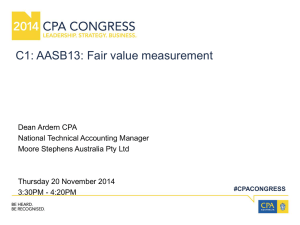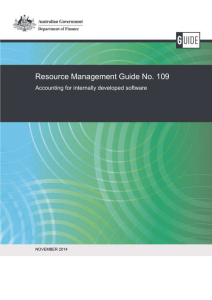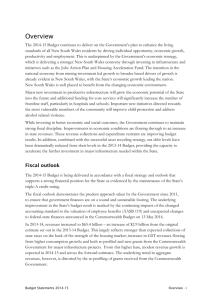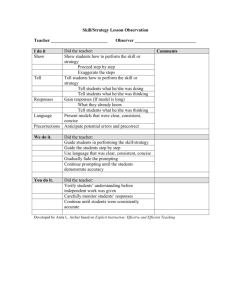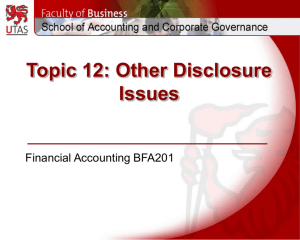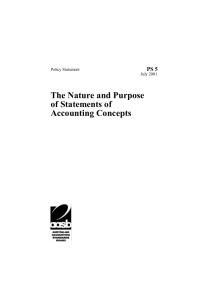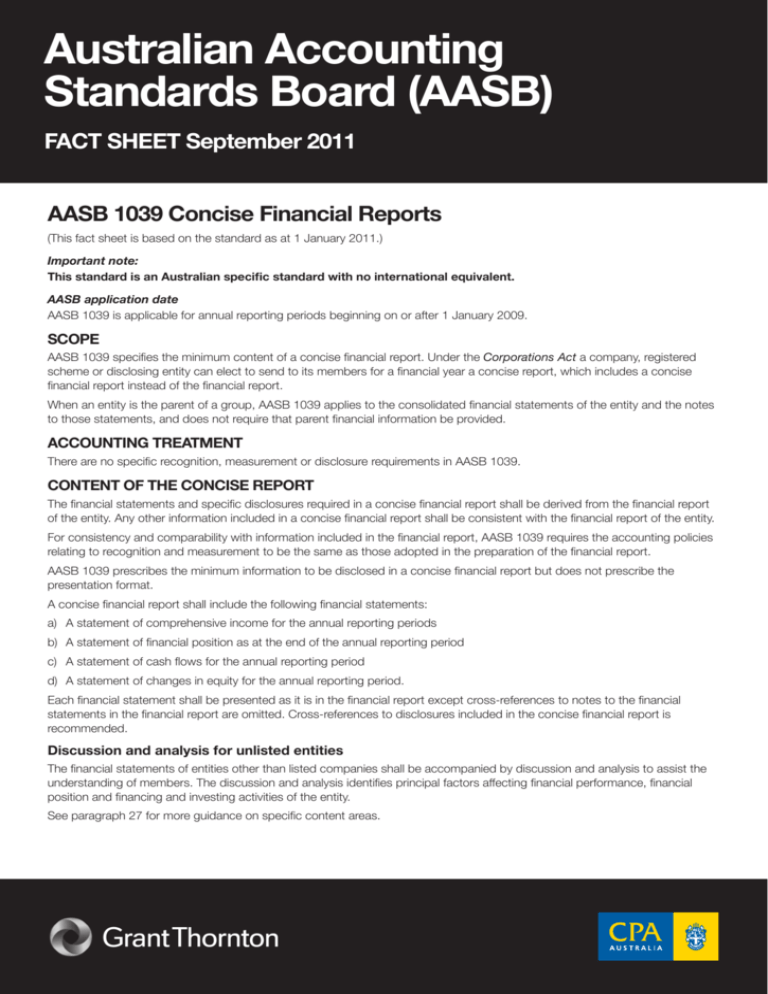
Australian Accounting
Standards Board (AASB)
FACT SHEET September 2011
AASB 1039 Concise Financial Reports
(This fact sheet is based on the standard as at 1 January 2011.)
Important note:
This standard is an Australian specific standard with no international equivalent.
AASB application date
AASB 1039 is applicable for annual reporting periods beginning on or after 1 January 2009.
Scope
AASB 1039 specifies the minimum content of a concise financial report. Under the Corporations Act a company, registered
scheme or disclosing entity can elect to send to its members for a financial year a concise report, which includes a concise
financial report instead of the financial report.
When an entity is the parent of a group, AASB 1039 applies to the consolidated financial statements of the entity and the notes
to those statements, and does not require that parent financial information be provided.
Accounting treatment
There are no specific recognition, measurement or disclosure requirements in AASB 1039.
Content of the concise report
The financial statements and specific disclosures required in a concise financial report shall be derived from the financial report
of the entity. Any other information included in a concise financial report shall be consistent with the financial report of the entity.
For consistency and comparability with information included in the financial report, AASB 1039 requires the accounting policies
relating to recognition and measurement to be the same as those adopted in the preparation of the financial report.
AASB 1039 prescribes the minimum information to be disclosed in a concise financial report but does not prescribe the
presentation format.
A concise financial report shall include the following financial statements:
a) A statement of comprehensive income for the annual reporting periods
b) A statement of financial position as at the end of the annual reporting period
c) A statement of cash flows for the annual reporting period
d) A statement of changes in equity for the annual reporting period.
Each financial statement shall be presented as it is in the financial report except cross-references to notes to the financial
statements in the financial report are omitted. Cross-references to disclosures included in the concise financial report is
recommended.
Discussion and analysis for unlisted entities
The financial statements of entities other than listed companies shall be accompanied by discussion and analysis to assist the
understanding of members. The discussion and analysis identifies principal factors affecting financial performance, financial
position and financing and investing activities of the entity.
See paragraph 27 for more guidance on specific content areas.
Australian Accounting
Standards Board (AASB)
Discussion and analysis for listed entities
Listed companies are not required by AASB 1039 to provide discussion and analysis in the concise financial report because
they are required by section 299A of the Corporations Act to provide an operational and financial report in the Directors’ Report
which is part of the concise report.
Disclosures
Refer Appendix 1 for a checklist to assist with AASB 1048 disclosure requirements.
Important definitions
Technical terms have the same meaning as in the relevant standards. The terms ‘concise report’, ‘concise financial report’,
‘financial report’, ‘listed company’ and ‘members’ have the meanings as given in Chapter 2M of the Corporations Act.
Appendix 1 – Disclosure checklist
This checklist can be used to review your financial statements – you should complete the Yes / No / N/A column about whether
the requirement is included and provide an explanation for No answers to ensure the completeness of disclosures.
Yes / No /
N/A
AASB
1039.28
Where the entity has prepared its financial report on the basis that the entity
is not a going concern, or where the going concern basis has become
inappropriate after the reporting date; has the entity disclosed this fact?
AASB
1039.29
Has the following information been disclosed for each reportable segment in
accordance with AASB 8?
Explanation
(if required)
a) Revenues from sales to external customers and revenues from
transactions with other operating segments of the same entity if the
specified amounts are included in the measure of segment profit or loss
reviewed by the CODM or are otherwise regularly provided to the CODM,
even if not included in that measure of segment profit or loss
b) A measure of profit or loss
c) A measure of total assets and
d) A measure of liabilities if such amount is regularly provided to the CODM.
AASB
1039.30
Have the following items for the period been disclosed, even if the amounts
are zero?
a) The amount of sales revenue recognized and included in revenue in
accordance with AASB 118 Revenue
b) The amount of dividends, in aggregate and per share, in respect of each
class of shares included in equity, identifying:
i. Dividends paid during the period and date of payment and
ii. Dividends proposed or declared before the financial report was
authorized for issue, and the expected date of payment, separately
identifying, where relevant, those recognized from those not
recognized as a distribution to equity holders during the period
c) In respect of each dividend disclosed in accordance with paragraph 30(b)
of this standard, the amount, in aggregate and per share, of the dividend
that:
i. Has been or will be franked and the tax rate at which the dividend has
been or will be franked and
ii. Has not been or will not be franked
d) Where the entity is required to comply with AASB 133, the amount of
basic earnings per share and diluted earnings per share.
2
Australian Accounting
Standards Board (AASB)
Yes / No /
N/A
AASB
1039.31
Explanation
(if required)
Has the entity disclosed the following:
a) The presentation currency used
b) In respect of each event occurring after the reporting date that does not
relate to conditions existing at the reporting date, the information required
by paragraph 21 of AASB 110 and
c) Where there is a change in accounting policy or estimates from those
used in the preceding reporting period, or a correction of a prior period
error, which has a material effect in the current reporting period or is
expected to have a material effect in a subsequent reporting period, the
information required about such a change or correction by the relevant
Accounting Standards that are applicable to the current reporting period.
AASB
1039.33
Has the first page of the concise financial report prominently displayed advice
to the effect that:
a) The concise financial report is an extract from the financial report
b) The financial statements and specific disclosures included the concise
financial report have been derived from the financial report
c) The concise financial report cannot be expected to provide as full
an understanding of the financial performance, financial position and
financing and investing activities of the entity as the financial report
d) Further financial information can be obtained from the financial report and
that the financial report is available, free of charge, on request to the entity.
3
OTHER MATTERS
Legal Notice
Copyright © CPA Australia Ltd (ABN 64 008 392 452), 2011. All rights reserved. Save and except for direct quotes from the Australian Accounting
Standards Board (AASB) and accompanying documents issued by the Australian Accounting Standards Board (AASB) (“AASB Copyright”), all content
in these materials is owned by or licensed to CPA Australia. The use of AASB Copyright in these materials is in accordance with the AASB’s Terms and
Conditions. All trade marks and trade names are proprietary to CPA Australia and must not be downloaded, reproduced or otherwise used without the
express consent of CPA Australia. You may access and display these pages on your computer, monitor or other video display device and make one
printed copy of any whole page or pages for personal and professional non-commercial purposes only. You must not (i) reproduce the whole or part of
these materials to provide to anyone else; and/or (ii) use these materials to create a commercial product or to distribute them for commercial gain.
Disclaimer
CPA Australia has used reasonable care and skill in compiling the content of these materials. However, CPA Australia makes no warranty as to the
accuracy or completeness of any information contained therein nor does CPA Australia accept responsibility for any acts or omissions in reliance upon
these materials.
These materials are; (i) intended to be a guide only and no part of these materials are intended to be advice, whether legal or professional; (ii) not a
complete representation of the Standard referred to and/or quoted and consequently are no substitute for reading the latest and complete standards.
All individuals are advised to seek professional advice to keep abreast of reforms and developments, whether legal or regulatory.
Limitation of Liability
To the extent permitted by applicable law, CPA Australia, its employees, agents and consultants exclude all liability for any loss or damage claims and
expenses including but not limited to legal costs, indirect special or consequential loss or damage (including but not limited to, negligence) arising out of
the information in the materials. Where any law prohibits the exclusion of such liability, CPA Australia limits its liability to the re-supply of the information.

